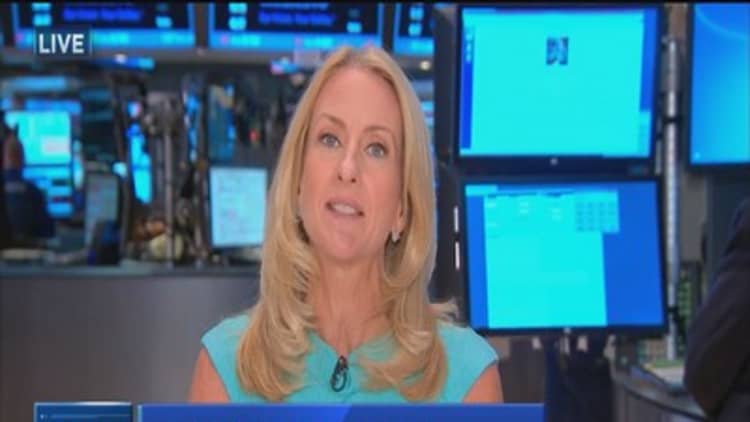
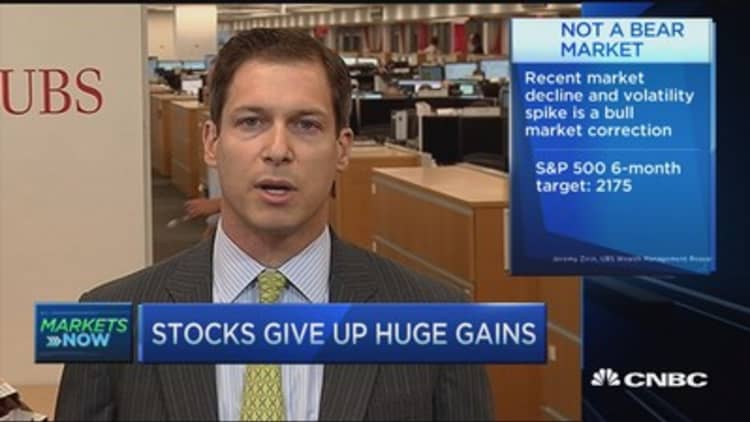
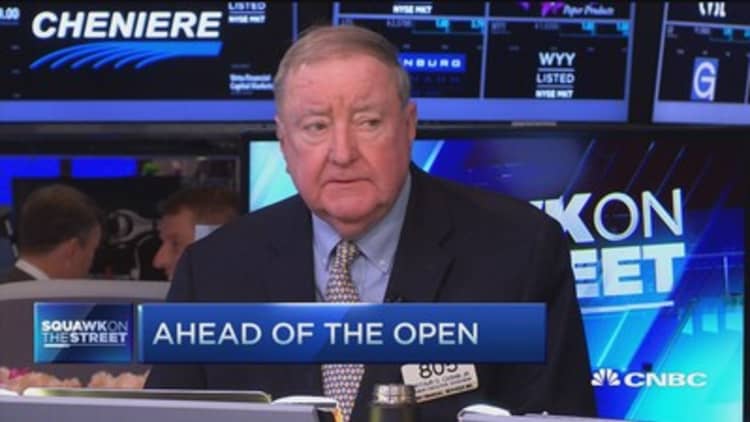
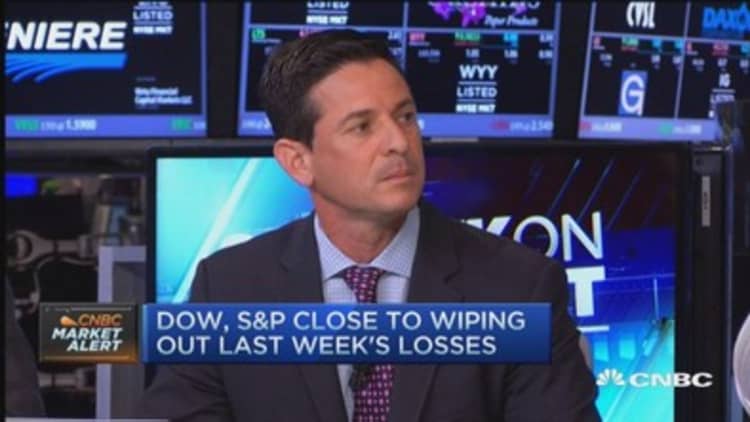
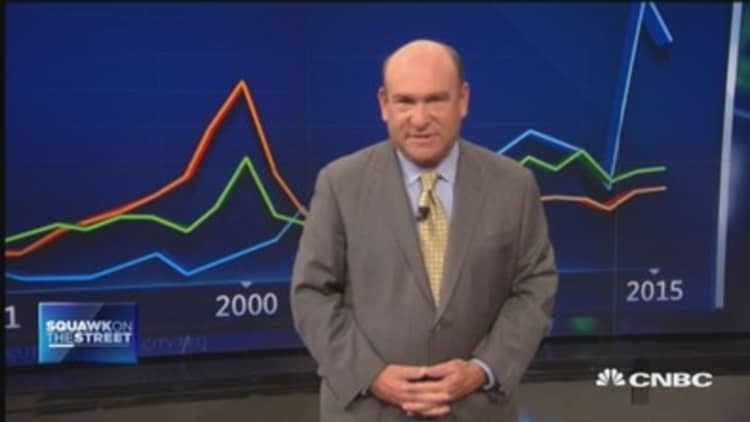
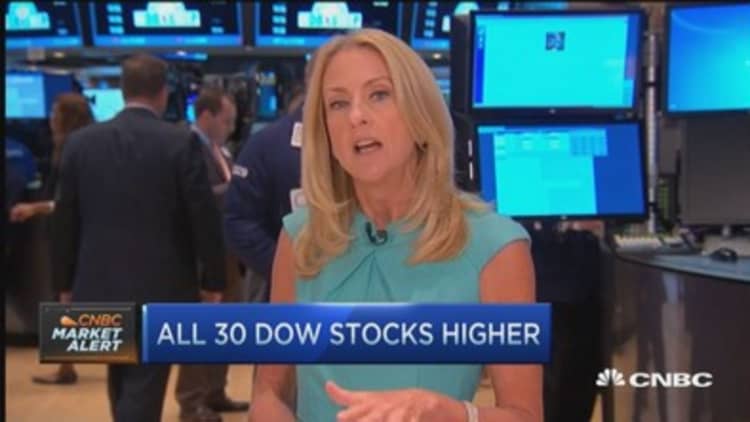
U.S. stocks closed more than 1 percent lower Wednesday, weighed by declines in oil prices and failing to extend a rally in global markets despite talk of stimulus overseas. (Tweet This)
"Again, after a really, really strong day yesterday and a gap up in the opening, we sold off," said Peter Coleman, head trader at Convergex. He noted pressure from weakness in oil and other commodities.
"This is the volatility that we're going to be in for the next few weeks between the Fed and China," he said. But "I don't think we'll go back and retest the lows from two weeks ago."
Selling accelerated leading into the close. In early afternoon trade, stocks turned lower to give up an opening rally of about 1 percent.
"I think the reversal has to do with the oil prices," said Peter Cardillo, chief market economist at Rockwell Global Capital. "Of course, the Apple event didn't move the stock much."
Apple closed nearly 2 percent lower, after initially spiking more than 1.5 percent amid its afternoon event, at which the company unveiled new products.
"Investors are clearly not impressed with the Apple event (Wednesday), mostly because nothing too unexpected came of it," said John Divine, analyst and assistant editor at InvestorPlace.com. "We all knew the next iteration of the iPhone wascoming, but the iPhone 6S and 6S Plus didn't blow anyone away."
Read MoreApple details new iPad Pro, iPhones and TV system
Energy ended down almost 2 percent to lead all sectors in the S&P 500 lower, while Chevron and Exxon Mobil were among the greatest blue chip decliners.
U.S. crude oil futures settled down $1.79, or 3.9 percent, at $44.15 a barrel. Brent also fell more than 3 percent to trade below $48 a barrel.
The Dow Jones industrial average closed down about 240 points, or 1.45 percent, after falling as much as 272.58 points in the minutes before the close. 3M, Home Depot, IBM and Apple had the greatest negative impact on the index.
Earlier, the Dow gained as much as 171.97 points in a failed attempt to join the S&P 500 and Nasdaq composite out of correction territory, less than 10 percent away from their 52-week highs. The Russell 2000 also briefly held out of correction mode.
"I think at the end of the day, while there's still hope triumphing here that China is going to do more, nothing definitive has been done, no certainty it's going to work," said Mark Luschini, chief investment strategist at Janney Montgomery Scott.
"I think we're seeing a little of that cooling enthusiasm for equities. The news is good. China recognizes its economic activity is slowing and is preparing to address it," he said.
The Nasdaq composite held mild gains for 2015 after reaching positive territory for the year Tuesday.
Read MoreHow to trade Apple before and after its big announcements
"At the end of the day, (there's) so much nervousness ahead of next week's meeting people are afraid of holding (positions)," said JJ Kinahan, chief strategist at TD Ameritrade.
Major averages 5-day performance
Traders also eyed the Job Openings and Labor Turnover Survey (JOLTS) which showed the number of job openings in July was a record 5.8 million, according to the U.S. Bureau of Labor Statistics. The hiring rate declined to 3.5 percent.
"Generally I thought the news was good. I wasn't too pleased about the hires," said Marie Schofield, chief economist and senior portfolio manager at Columbia Threadneedle Investments.
The key nonfarm payrolls report last Friday reinforced expectations that labor conditions are strong enough to support a rate hike, which could possibly come as soon as the Federal Reserve's meeting next week.
Weekly mortgage applications fell 6.2 percent as refinancings slid.
Treasury yields spiked after holding relatively steady Tuesday. The Treasury Department auctioned $21 billion of 10-year notes at a high yield of 2.235 percent.
Following the auction, the U.S. 10-year yield fell to 2.19 percent and the edged lower to 0.74 percent. Earlier, the 2-year yield hit 0.76 percent, near the highest level since April 2011.
"That's a market that's thinking the Fed could pull the trigger. The JOLTS data is further evidence the labor market is tightening," said Peter Boockvar, chief market analyst at The Lindsey Group.
The U.S. dollar pared gains to trade flat against major world currencies, with the euro above $1.12 and the yen near 121 yen against the greenback.
Earlier, stocks opened sharply higher following strong gains in markets overseas.
"It's the two giants in Asia, China and Japan, coming out with their fiscal moves," said David Lafferty, chief market strategist at Natixis Global Asset Management. "That combination certainly was powerful for Asia and that's spilling over into Europe and the U.S."
Japan's Nikkei index jumped 7.7 percent for its biggest one-day gain since 2008 and China's Shanghai Composite index closed up 2.3 percent.
The rally supported an initial surge in Europe, where the German DAX jumped about 2 percent before paring gains to close 0.3 percent higher.
"Today is more on, OK, the foreign markets did well enough last night. The rest of the working world reads the news and they don't want to miss out on a bounce," said Robert Pavlik, chief market strategist at Boston Private Wealth.
He added that bad economic news in China leading to expectations of more stimulus in the country also supported investor sentiment.
China's Ministry of Finance said the government will strengthen fiscal policy, boost infrastructure spending and speed up reform of its tax system, adding to other steps to re-energize sputtering growth.
Japanese stocks also rallied on back of comments by Prime Minister Shinzo Abe that the government aims to lower the corporate tax rate.
The Dow futures gained more than 200 points in early trade. U.S. stocks closed more than 2 percent higher for their second-best day of the year Tuesday, rebounding after a long weekend and their second-worst week of the year.
"Some global equity indices have gapped up in a bullish short-term development, and others have cleared minor resistance levels, such as their 20-day moving averages," Katie Stockton, chief technical strategist at BTIG, said in a morning note. "The impressive action may not be sustained for the balance of the week given intraday overbought conditions, but it may be enough to allow breakdowns to remain largely unconfirmed this Friday."
Major U.S. Indexes
On the earnings front, Krispy Kreme and Quiksilver were scheduled to report earnings after the close.
Read MoreEarly movers: AAPL, UAL, LNG, PLAY, CLR, M, YHOO & more
The Dow Jones Industrial Average closed down 239.11 points, or 1.45 percent, at 16,253.57, with Chevron leading all blue chips lower.
The closed down 27.37 points, or 1.39 percent, at 1,942.04, with energy leading all 10 sectors lower.
The Nasdaq closed down 55.4 points, or 1.15 percent, at 4,756.53.
The CBOE Volatility Index (VIX), widely considered the best gauge of fear in the market, traded above 26.
About three stocks declined for every advancer on the New York Stock Exchange, with an exchange volume of 928 million and a composite volume of nearly 3.6 billion in the close.
Gold futures settled down $19.00 at $1,102.00 an ounce.
—Reuters contributed to this report.
On tap this week:
Wednesday
Earnings: Hovnanian, Palo Alto Networks, Box, Krispy Kreme
Thursday
Earnings: Lululemon Athletica, Finisar, Zumiez
8:30 a.m.: Jobless claims
8:30 a.m.: Import and export prices
10 a.m.: Wholesale trade
10:30 a.m.: Natural gas inventories
11:00 a.m.: Oil inventories
1 p.m.: 30-year bond auction
4:30 p.m.: Fed balance sheet, money supply
Friday
Earnings: Kroger, Mattress Firm
8:30 a.m.: PPI
10 a.m.: Consumer sentiment
1 p.m.: Oil rig count
2 p.m.: Treasury budget
More from CNBC.com:


